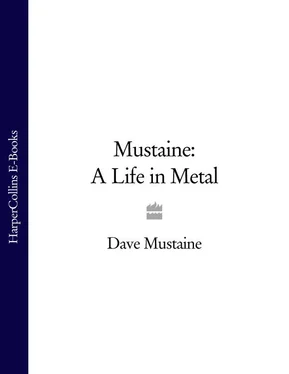And I went nuts.
“What are you doing?”
“She’s scratching the car, man,” James said, as if that was an acceptable excuse for kicking a dog.
“Fuck you!”
The actual fight didn’t happen right there. They call it a hang fire, like when there’s an unexpected delay between the trigger of a gun being pulled and the actual discharge of the weapon. You know it’s coming, and there’s no stopping it. It’s just a matter of time. James and I alternately cursed at each other and refused to speak, until eventually we were both in Ron’s house, preparing to rehearse, and tensions boiled over. There was another round of accusations and insults, more cursing, more threats.
“You keep talking like that, I’m going to punch you in the mouth,” I said.
“Fuck off!”
In the middle of this exchange, Ron walked out of the bathroom and into the living room. He and James went way back, and despite the fact that James often treated him like shit, Ron instinctively defended his friend.
“You hit him, you’ll have to hit me first.”
“Shut up and sit the fuck down,” I said.
And then James jumped to Ron’s defense. “You touch him, you’re going to have to hit me first.”
Jesus, I thought, what is this, some kind of fucking game show?
I realized I would have to make a decision.
“Okay, you win,” I said, and with that I threw a right cross that landed flush against James’s face, turning his mouth into a pile of bloody Chiclets. To my surprise, Ron immediately jumped on my back. Reflexively, I gave him a hip toss; he flew across the room and landed on an entertainment center, sending shards of particleboard all over the place and destroying the old Pong video game hooked up to the TV. The fight might have gone on longer if not for the presence of my friend and martial arts training partner Rick Solis, who quickly intervened. I was enraged, ready to kill both Ron and James, when Rick came up from behind and grabbed my elbow, pinching the ulnar nerve and rendering me incapacitated. * We stood there together for a moment, saying nothing, when suddenly James began screaming at me.
“You’re out of the band! Get the fuck out of here!”
Ron was yelling, too. Lars, meanwhile, was standing in a corner, just sort of twirling his hair, and trying unsuccessfully to mediate a settlement. “Come on, man…I don’t want it to end this way.”
“Fuckyou! I quit!”
“Good! Fuck you, too!”
WHILE OUR DISAGREEMENTShad never reached this level of intensity, it should be noted that by this time Metallica was already a band struggling with personality conflicts. Each of us was guilty of pointing the finger of blame at one time or another. My job was safe, as far as I could tell, although obviously I’d failed to assess the situation properly.
The dismissal lasted roughly twenty-four hours. I returned for rehearsal the next day, apologized to everyone, and was welcomed back into the fold. Everything was fine. Except it wasn’t. Some things can’t be undone, and this was one of them. In many ways, it was the beginning of the end. Ron and I grew increasingly annoyed with each other. I thought he was smug and spoiled and not particularly talented; he viewed me as unpredictable and dangerous—not inaccurate, I must confess. When a break-in at Ron’s place was traced back to acquaintances of mine (not friends, mind you, and I certainly had no idea what they had done), Ron became angry and accusatory. My response, and I don’t say this with any pride, was to walk into the rehearsal room one day when Ron wasn’t around and pour a can of beer into the pickups of his Washburn bass, effectively destroying a very expensive piece of equipment.
I knew this would infuriate Ron, but I didn’t care. My rationale went something like this:
I don’t like you, I don’t like that you pinned this break-in on me, I don’t like that you’re a mama’s boy, I don’t like that you seem to have everything going on, everything handed to you, and you don’t appreciate it. It doesn’t seem like you’re one of us.
By this point, in the late fall of 1982, Metallica had begun performing regularly in San Francisco, where the metal scene was significantly less artificial than it had been in Los Angeles. Hair and makeup mattered less than the music. When it came to playing music, Metallica was like nothing anyone had seen or heard before. But there was always room for improvement. And that’s where Cliff Burton came in.
Cliff was the star bass player for a Bay Area band called Trauma. That term alone—“star bass player”—should tell you something, because bass players are typically at the bottom of the rock ’n’ roll food chain. Guitar players and singers are at the top, drummers in the middle, bass players at the bottom. I was once quoted as saying, “Playing the bass is one step up from playing the kazoo,” which predictably pissed off a lot of bass players, but it’s essentially true. Of course, there are exceptions to every rule, and Cliff was definitely not a glorified kazoo player. He was brilliant. The first time I saw him play, I knew he was something special, and so did Lars and James, which is why they began surreptitiously courting Cliff while Ron McGovney was still in the band. *
Cliff was worthy of pursuit, and I think we all (with the exception of Ron) saw him as the “missing piece.” We had arrived in San Francisco as the band of the moment, an underground sensation that quickly surpassed everyone, even the popular local thrash kings Exodus. We were locked and loaded, with an exhausting stage show featuring a dangerous, loudmouthed motherfucker on guitar and a variation on heavy metal that was at once heavier, faster, and more melodic. We were the real deal. As was Cliff. Trauma was nothing special, but everyone knew the band was worth watching if only to witness Cliff’s wizardry with a wah-wah pedal. It’s not often that a bass player stands out as the star of a band, but Cliff, with a wild mane of hair and an athletic, muscular style of playing, pulled it off. He was an innovator.
He also was reluctant to join Metallica or any other band not based in the Bay Area. But Lars kept pursuing Cliff. Eventually, when Ron departed, just a few days after the violation of his Washburn bass, * the door was open for Cliff to join the band. But concessions would have to be made. Cliff was impressed by what he’d seen of our work and more than willing to trade Trauma for Metallica. Under one condition.
We’d have to move to San Francisco.
If there was any hand-wringing over this decision, I don’t recall it. We all knew Cliff was talented enough to present what would ordinarily be considered an outrageous bargaining chip: Relocate the whole band? For a bass player! He was that good. And we were that driven; we were willing to do anything to be successful. I think we all recognized that by adding Cliff, we could become the greatest band in the world.
THE TRANSITION TOOKa few months, during which we altered living and professional arrangements in a half-assed attempt to save some money and prepare for the move to San Francisco. Shortly before Christmas 1982, James got the boot from Ron McGovney (no surprise, since Ron was understandably reluctant to continue supporting James after splitting with Metallica). I’d already moved back into my mother’s house because…well, because I was broke. So I invited James to come and live with me and my mother, creating a variation on the Three’s Company theme with predictably disastrous results. Suddenly you had two heavy metal warriors living with my mom, the quiet little housekeeper. To say she was bummed by the whole arrangement would be an understatement, and not merely because of her religious affiliation. The lifestyle we were leading—the drinking, fighting, carousing—was enough to give any parent cause for concern. But to have it happening under her own roof? It couldn’t have been easy. Especially as she came to realize that it wasn’t merely a phase. I was pretty good at playing guitar, and I was serious about making a living at it. But that wasn’t the only reason I played. It wasn’t only about strutting and getting laid and trying to become famous. When I held a guitar in my hands, I felt good about myself. When I played music, I felt a sense of comfort and accomplishment that I’d never known as a child. When I replicated the songs that I loved, I felt an attachment to them and to the musicians who had composed them. And when I started writing songs of my own, I felt like an artist, able to express myself for the very first time. Maybe my mother sensed all of this, and that’s why she put up with all the craziness. Or maybe that’s just what mothers do.
Читать дальше







